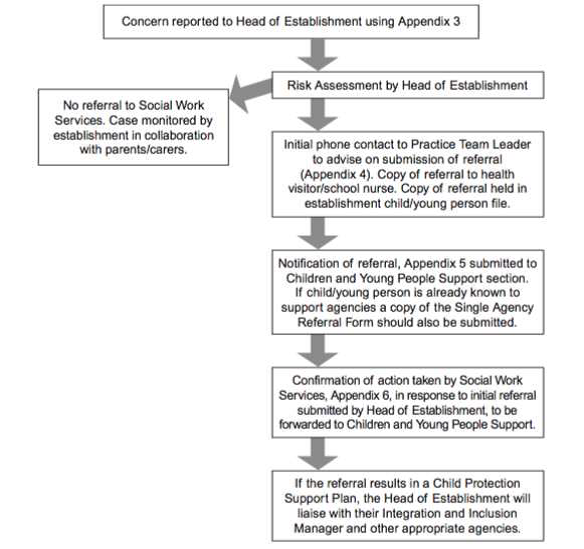Link to Word Copy
ST MONICA’S (MILTON)
PRIMARY SCHOOL
Child Welfare & Safety
and Child Protection Policy
All educational establishments and services must take positive steps to help children and young people protect themselves by ensuring that programmes of health and personal safety are central to the curriculum and should have in place a curriculum that ensures that children/young people have a clear understanding of the difference between appropriate and inappropriate behaviour on the part of another person, no matter who.
At St Monica’s Primary School we maintain a positive ethos and climate which actively promotes children and young people’s welfare and a safe
environment by:
- Ensuring that children and young people are respected and listened to
- Ensuring that programmes of health and personal safety are central to the curriculum
- Ensuring that staff and visitors are aware of child welfare and safety and protection issues and procedures
- Establishing and maintaining close working relationships and arrangements with all other agencies to make sure that professionals collaborate effectively in protecting children and young people
Should any member of staff have any concerns regarding the welfare or safety of any child they must report these concerns the Headteacher or the person deputising for the Headteacher, after judging that there may be grounds for concern regarding the welfare or safety of any child in St Monica’s Primary School (See Appendix 1)
***Please note that Mr Broadley, the Headteacher is the
Child Protection Co-ordinator. If Mr Broadley is out of school, please report to the Depute Head Teacher, Mrs McGinley.
Pastoral Concerns:
At times our staff may have general concerns about a particular child. Staff will then complete a Pastoral Concern. The Child Protection Co-ordinator will be notified of this concern to determine the next course of action.
Staff Awareness of MC57 Procedures:
The Safety and Welfare of our children is paramount and it is every adult’s responsibility to be fully converse with Management Circular 57 and their responsibility within it.
At the beginning of each academic session, time will be given over to Management Circular 57 and any new member of staff coming into school, student teachers or work experience visitors will be given time with the Child Protection Co-ordinator to understand their responsibilities.
It is vital that all staff are fully aware of definitions of risk and referral procedures within MC57.
A concern prompted by any of the following should be reported in accordance with the stated procedures outlined below:
• a specific incident;
• a disclosure made by a child or young person or parent/carer;
• information from a third party;
• adult behaviours/circumstances that may place the child at harm;
• child behaviours/circumstances that may place the child at risk of harm;
• a culmination of minor concerns over a period of time.
MC 57 Flowchart

***Further Child Protection Guidance is available on Glasgow Online
Remember, you must refer any concern to the designated
Child Protection Co-ordinator if a disclosure is made to you.
We are a Nurturing School
The six principles of nurture are adhered to at all times in our school.
1. Children's learning is understood developmentally
Staff respond to children not in terms of arbitrary expectations about ‘attainment levels' but in terms of the children's developmental progress. The response to the individual child is ‘as they are', underpinned by a non-judgemental and accepting attitude.
2. The classroom offers a safe base
The organisation of the environment and the way the group is managed contains anxiety. The school offers a balance of educational and domestic experiences aimed at supporting the development of the children's relationship with each other and with the staff. The classes are organised around a structured day with predictable routines. Great attention is paid to
detail; the adults are reliable and consistent in their approach to the children.
3. Nurture is important for the development of self-esteem
Nurture involves listening and responding. Children respond to being valued and thought about as individuals, so in practice this involves noticing and praising small achievements.
4. Language is understood as a vital means of communication
Language is more than a skill to be learnt, it is the way of putting feelings into words. Some children often ‘act out' their feelings as they lack the vocabulary to ‘name' how they feel. Words are used instead of actions to express feelings and opportunities are created for extended conversations or encouraging imaginative play to understand the feelings of others.
5. All behaviour is communication
This principle underlies the adult response to the children's often challenging or difficult behaviour. ‘Given what I know about this child and their development what is this child trying to tell me?' Understanding what a child is communicating through behaviour helps staff to respond in a firm but non- punitive way by not being provoked or discouraged. If the child can sense that their feelings are understood this can help to diffuse difficult situations. The adult makes the link between the external / internal worlds of the child.
6. Transitions are significant in the lives of children
St Monica’s Primary School helps the child make the difficult transition from home to school. However, on a daily basis there are numerous transitions the child makes, e.g. between sessions and classes and between different adults. Changes in routine are invariably difficult for vulnerable children and need to
be carefully managed with preparation and support.
Quality Assurance
Our Child Welfare & Safety and Child Protection Policy will be monitored and reviewed regularly within the school’s audit
and review process.
Appendix 1
The Child Protection Co-ordinator
is Mr Broadley, Headteacher.

If Mr Broadley is unavailable, the Deputy Child Protection Co-ordinator is Mrs McGinley,
Depute Head Teacher.
